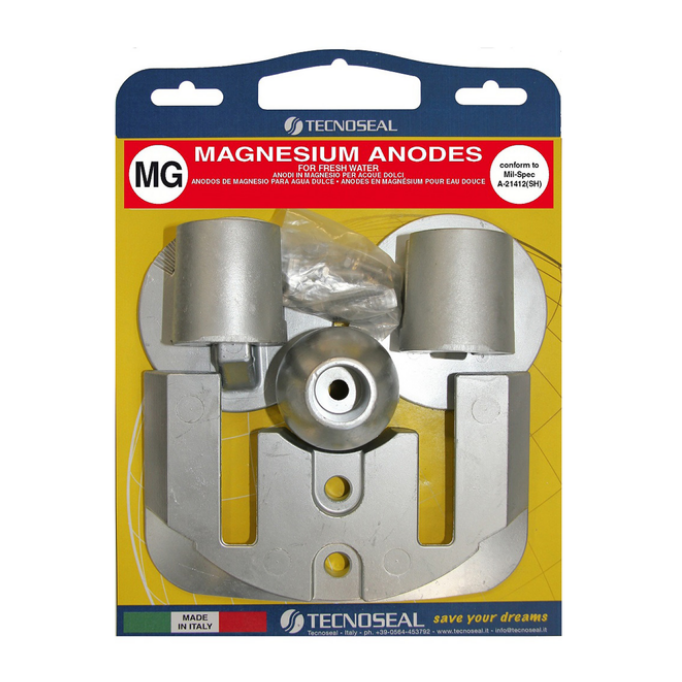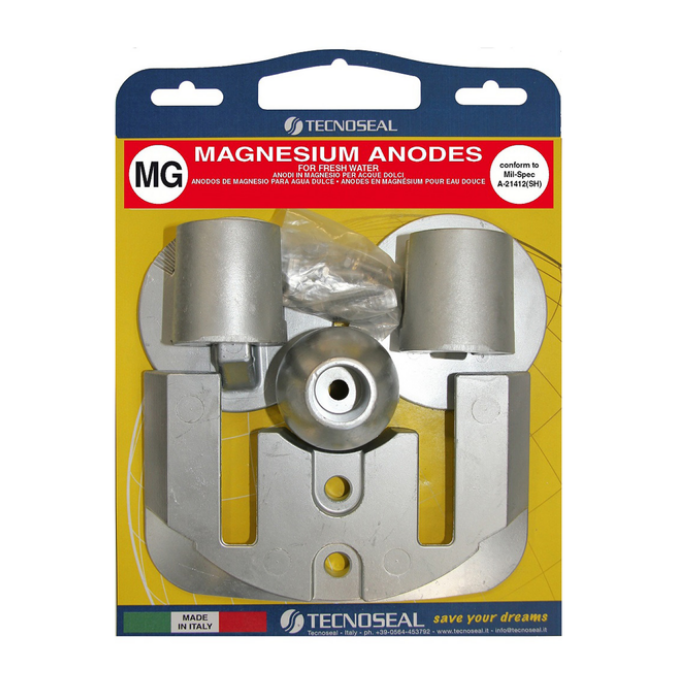Tecnoseal
ANODE KIT MERCURY BRAVO III-2004 to PRESENT (Magnesium)
ANODE KIT MERCURY BRAVO III-2004 to PRESENT (Magnesium)
Couldn't load pickup availability
MERCURY BRAVO III-2004 to Present - Magnesium
For Motorboats with sterndrive.
Are you looking for more information about anodes—typically used in various applications like boating, plumbing, and electrical systems to prevent corrosion. Anodes are essential for protecting metal surfaces that are exposed to water or other corrosive environments.
Click the link below to read our blog
https://yachtmailchandlery.com/blogs/news/what-is-an-anode?_pos=10&_sid=f48a4f642&_ss=r
What Are Anodes?
An anode is a metal component used in a process called cathodic protection to prevent corrosion. Anodes are commonly used in marine environments, but they’re also applied in industries like water heating, pipelines, and electrical systems.
There are three main types of anodes:
- Sacrificial Anodes: These are typically made of zinc, aluminum, or magnesium. They work by being more "electrically active" than the metal they are protecting (like a boat's hull). Over time, the anode corrodes instead of the metal part, effectively "sacrificing" itself to protect more valuable components.
- Impressed Current Anodes: These are used in more industrial applications and rely on an external power source to deliver a constant flow of current to prevent corrosion.
- Galvanic Anodes: Also sacrificial, but specifically designed to work in galvanic corrosion environments where two metals are in contact with an electrolyte (usually water).
Key Uses of Anodes:
- Boats & Marine Equipment: Anodes are commonly used on boats to protect the hull, propellers, and other metal parts from saltwater corrosion.
- Water Heaters: They’re used to prevent rust and extend the life of water heaters.
- Pipelines & Storage Tanks: Anodes protect underground pipelines and tanks from corrosion.
- Electrical Systems: In some electrical applications, anodes help to prevent the degradation of metal surfaces due to corrosion or electrical currents.
Why Are Anodes Important?
Anodes are critical for preventing galvanic corrosion, a type of corrosion that happens when two different metals come into contact in the presence of an electrolyte (like water). Without an anode, the more valuable metal (like the hull of a boat) would corrode over time. The anode sacrifices itself to protect the other metal, prolonging its life.
Types of Anodes by Material:
- Zinc Anodes: Widely used in seawater environments. Zinc is the most common material for sacrificial anodes because it offers a good balance between cost and performance.
- Aluminum Anodes: Often used in freshwater or brackish water, aluminum anodes last longer than zinc but are more expensive.
- Magnesium Anodes: Typically used for freshwater environments, particularly in places where zinc or aluminum may not be effective.
How Do You Know When to Replace an Anode?
- Visual Inspection: Check for signs of heavy wear or corrosion. If the anode has become significantly smaller or is completely corroded, it’s time to replace it.
- Performance Loss: If you notice increased corrosion on your boat or equipment, even with the anode in place, it might be too far gone to protect your metal surfaces.
Anode Maintenance:
- Regular Checkups: Inspect your anodes every season (especially for boats) to ensure they’re still doing their job.
- Replace Before They’re Gone: It’s better to replace an anode a little earlier than to let it wear out completely and risk corrosion of the metal parts you’re trying to protect.


